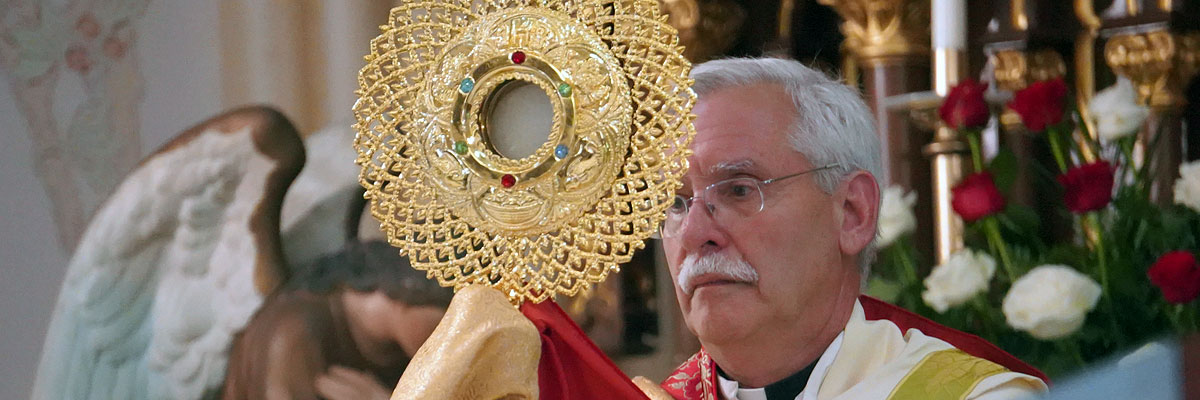Official Website of the
Catholic Diocese of Little Rock
St. Teresa of Kolkata Mass 2020
Published: September 5, 2020
Bishop Anthony B. Taylor preached the following homily at Our Lady of Good Counsel Church in Little Rock on the feast day of St. Teresa of Kolkata (formerly Calcutta) on Saturday, Sept. 5, 2020. It is based on readings for the 23rd Sunday in Ordinary Time, Year A.

Bishop Taylor
Parents try to teach their kids all sorts of things and for our family the most difficult lesson was not to fight, or at least to do it outside. There seems to be some instinct inside children to defend their turf at all costs, for instance a kid fighting to keep a younger brother from playing with a toy he isn’t using anyway.
I remember that was the case for one of my nephews, so my sister spent a lot of time trying to show him how to share. Mother Teresa, whose feast we celebrate today, did this on a big scale, calling on us to share with those in greatest need.
But then when that same nephew went to school a few years later, the situation was suddenly reversed. Older kids were now picking on him and I found it amusing to hear the same sister — the one who was always telling him not to fight — now was giving him lessons on how to stick up for his rights. When it was better to resist and when to get a teacher to intervene.
And we do this by explaining how his actions are hurting us, spending time listening to him describe the problem from his point of view, trying to build bridges of understanding. With Jesus that was the primary thing, to save the relationship, not to win the fight.
That’s what is going on in our Gospel today. There are lots of places in the Bible where the Lord gives instructions on how to share, be flexible, turn the other cheek and walk the extra mile, but today’s Gospel is the only passage that immediately comes to mind where we are taught how to defend our own rights and by extension, the rights of others.
I take that to mean that while Jesus doesn’t intend his followers to be doormats — Mother Teresa was no doormat — he is more worried about us becoming obsessed with the protection of our own rights and forgetting about others.
As we know, playground fights usually are not all that constructive. Jesus instructs his followers that if they are going to defend their own rights, they need to do it constructively. “If your brother should commit some wrong against you, go and point out his fault to him, but keep it between you and him. If he listens to you, you have won your brother.”
Notice, here Jesus gives us the purpose of the whole matter — to win the brother or sister, to save the relationship, not to protect our fragile ego, not to defend our turf, not to win the argument, not to come out on top, not to feel good, but rather quite simply to win over the offending and offended brother.
And we do this by explaining how his actions are hurting us, spending time listening to him describe the problem from his point of view, trying to build bridges of understanding. With Jesus that was the primary thing, to save the relationship, not to win the fight.
If one on one conversations don’t work, then take the next step — bring along a couple of others to help explain, and if not that, then the Church, and if not even that, then “Treat him as you would a Gentile or a tax collector.” That is a difficult statement to understand.
Remember that in Jesus’ time the Jews and Gentiles did not get along and no one liked tax collectors. Is Jesus telling us to reject or even hate them? But notice, this is Matthew’s Gospel we are reading, and he had been a tax collector. Moreover, there were many Gentiles in Matthew’s community. The only way I know to interpret this is to remember how Jesus treated Gentiles and tax collectors: His door was always open. His offer of friendship was never withdrawn.
That is how it should be for us in all our dealings — and in this we have no better example than Mother Teresa and her Missionaries of Charity. It shouldn’t have to happen very often, but when it does become necessary to take a stand in defense of our rights or the rights of others, whether within our families, or at work or in general society, we should do it cautiously and constructively.
The primary thing is the relationship. If we forget that, we run the danger of perhaps winning the argument, but in the process we lose the friend. Jesus challenges us to preserve the relationship if we possibly can. But if our best efforts fail, be sure the door to our friendship is not locked from the inside.









